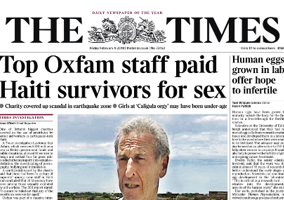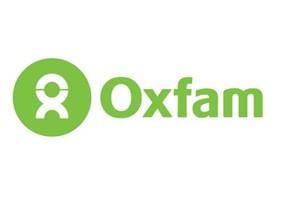As the safeguarding scandal surrounding Oxfam’s handling of safeguarding issues unfolds, there has been a deluge of online and media commentary surrounding the issue.
Here are some of the key bits so far.
Representative bodies
Bond, the umbrella body for international aid charities, issued a statement on Sunday saying that it was working with its members and the Charity Commission.
NCVO’s chair, Peter Kellner, said in a statement: “All the major charities have policies and procedures in place and dedicate significant effort to minimising the risk of abuse taking place. However, it is clear that more can and must be done, not only to revive the reputation of those charities in the news but also to maintain public confidence in the sector as a whole.”
Elsewhere Karl Wilding, director of public policy and volunteering at NCVO, wrote a blog on the umbrella body’s website.
He said: “A critical first step is to establish fully and clearly what happened, in a process that involves the Charity Commission as regulator and DfID as one of the major funders of organisations in this field. Until we have that clarity, it will be difficult to learn the right lessons.
"We’re pleased to see that Bond, the umbrella body for international development, will be coordinating charities and working with the Charity Commission on this. At NCVO, we will offer our full support to this process.”
On Twitter, Vicky Browning, chief executive of Acevo, said: “If we want charities to be transparent - & we do - we're unfortunately going to hear more about things going wrong. Harassment and abuse clearly exist across all sectors and countries, & no-one can be complacent.”
If we want charities to be transparent - & we do - we're unfortunately going to hear more about things going wrong. Harassment and abuse clearly exist across all sectors and countries, & no-one can be complacent.
— Vicky Browning (@browning_vicky) February 11, 2018
Daniel Fluskey, head of policy and research at the Institute of Fundraising, tweeted: “Abuse is a societal problem, and safeguarding vital to protect vulnerable people. Charities aren’t perfect, and when things go wrong (as in sports, religious, or health organisations) the right response is to directly address the problem, not cut funding.”
Abuse is a societal problem, and safeguarding vital to protect vulnerable people. Charities aren’t perfect, and when things go wrong (as in sports, religious, or health organisations) the right response is to directly address the problem, not cut funding.
— Daniel Fluskey (@danielfluskey) February 12, 2018
Andrew O’Brien, director of policy and engagement at the Charity Finance Group, wrote a blog on its website reminding charities about reporting serious incidents to the Charity Commission.
He said: “Serious incidents can highlight concerns around the general mismanagement and conduct of the charity. The Charity Commission needs to be given a picture of the incident, the response and what steps are being taken to prevent it happening again so that it can decide whether there needs to be a further investigation into the charity.
“Serious incident reporting isn’t about criminal investigations, if you think that an issue requires this you should report it to the police or relevant authority as well as the Charity Commission.”
Development sector
Save the Children’s chief executive Kevin Watkins wrote a blog yesterday outlining the steps his charity has taken on safeguarding and saying that he had written to the secretary of state for international development offering to work with others.
“As an organisation, and as a sector, we have a moral responsibility to protect the vulnerable children and adults we come into contact with through our programmes. We also have a responsibility to the UK public and to our donors to ensure that we meet the highest standards, not just in financial reporting, but in the behaviour we expect of our staff,” he said.
In a statement, Christian Aid said it had investigated two sexual misconduct cases overseas in the past 12 months.
“One investigation led to the dismissal of a staff member, while the other case resulted in disciplinary action.”
It added: “We continuously review and refresh our current policies and practices, to ensure that we take timely and corrective actions to prevent and censure such behaviour, ensuring we have confidential and robust mechanisms that enable and support our workforce, beneficiaries and stakeholders to report concerns and incidents without fear or favour, and to ensure protection and support for individuals who report or have experienced such incidents.
“Across Christian Aid we continue to work with colleagues to ensure a better (and shared) understanding of what sexual harassment is, and the zero-tolerance culture we expect – including by training staff across the global organisation on the organisation’s code of conduct.”
ActionAid said in a statement: “Throughout the organisation we have a zero-tolerance policy on any form of sexual harassment and misconduct, and clear child protection policies aimed to protect beneficiaries. We have a whistleblowing policy to encourage staff to come forward if they have any concerns and if an allegation is made, processes are in place to ensure immediate and decisive action is taken.
“We have recently been working with external safeguarding experts to develop further our policy and procedures with regards to children and vulnerable adults, to ensure they are fit for purpose and in line with our new strategy. This includes training on the policy and procedures for all staff.
“It is essential that we are transparent and accountable, both to the communities where we work and to inspire confidence in those who so generously support our work with women and girls living in the world’s poorest places and help change lives for good.”
In the media
Guardian columnist Zoe Williams wrote: “We are not looking at a rightwing media conspiracy against Oxfam: there is no moral case for discovering the Haiti scandal and not publishing it.” However, on claims that malpractice is widespread, she added that “attempts to imply contagion are in bad faith”.
Also on the Guardian, Matthew d’Ancona warned: “In the era of Trump, Brexit and silken Rees-Moggery, the notion that prosperous nations have a moral and practical responsibility to the poorest is fading from fashion.”
In the Times, which broke the story last week, there is an interview with Linda Polman – a Dutch journalist who has covered international disasters.
She told the paper that the problem is widespread and that agencies don’t fire people because “they are protecting their own reputation with the public and the donor governments. They keep it a secret. They don’t talk about it. They keep it under their hats”.
Elsewhere in the Times today, Melanie Phillips, one of the papers columnists, called for tougher regulation of the sector.
She said the Charity Commission “was fooled” by Oxfam in 2011. She added: “The Oxfam scandal has exposed this culture of impunity. As Priti Patel observes, however, this is but the tip of a sanctimonious and morally compromised iceberg which now needs to be hauled into view.”
On HuffPost today, Anastasia Kyriacou, who is aid and development writer for AidEx, called for solidarity with the sector.
“Regardless of the apology and shame professed on behalf of the charity’s chief executive Mark Goldring, Oxfam will quite literally pay a price for the scandal, as donors may respond by withdrawing funding,” she said.
“Measures must be taken to prevent such behaviour in the future and more must be done to ensure events like this cannot be concealed.”
She added: “As for the rest of the sector, namely field workers who risk their lives to help others every single day, they must not be prevented from carrying out their invaluable and necessary humanitarian work. Which is why we must call on solidarity at a time of crisis for the aid and development community.”
Writing in the Telegraph, Wiliam Hague former Conservative Party leader, defended the aid budget.
“A reduction in aid would be a strategic blunder, ultimately damaging our own national interest and our ability to deal with one of the biggest problems heading our way,” he said, adding: “The case for the type of work done by Oxfam is too strong to allow it to be undermined by bad behaviour and inadequate standards of disclosure or investigation.”
|
Related articles











